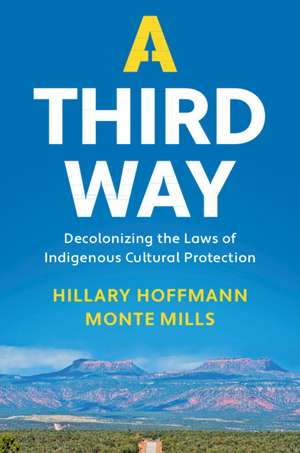A Third Way: Decolonizing the Laws of Indigenous Cultural Protection
Autor Hillary M. Hoffmann, Monte Millsen Limba Engleză Paperback – 22 iul 2020
| Toate formatele și edițiile | Preț | Express |
|---|---|---|
| Paperback (1) | 254.16 lei 6-8 săpt. | |
| Cambridge University Press – 22 iul 2020 | 254.16 lei 6-8 săpt. | |
| Hardback (1) | 692.00 lei 3-5 săpt. | |
| Cambridge University Press – 22 iul 2020 | 692.00 lei 3-5 săpt. |
Preț: 254.16 lei
Nou
Puncte Express: 381
Preț estimativ în valută:
48.65€ • 52.86$ • 40.89£
48.65€ • 52.86$ • 40.89£
Carte tipărită la comandă
Livrare economică 21 aprilie-05 mai
Preluare comenzi: 021 569.72.76
Specificații
ISBN-13: 9781108710923
ISBN-10: 1108710921
Pagini: 174
Ilustrații: 6 b/w illus.
Dimensiuni: 152 x 228 x 10 mm
Greutate: 0.23 kg
Editura: Cambridge University Press
Colecția Cambridge University Press
Locul publicării:New York, United States
ISBN-10: 1108710921
Pagini: 174
Ilustrații: 6 b/w illus.
Dimensiuni: 152 x 228 x 10 mm
Greutate: 0.23 kg
Editura: Cambridge University Press
Colecția Cambridge University Press
Locul publicării:New York, United States
Cuprins
Preface; 1. Legal history and foundations; 2. The jurisdictional framework of the second way, and the Cherokee diaspora; 3. Religious freedom, the value of sacred places, and the price of cultural ignorance; 4. Clashing values, the Blackfeet, and a measure of success in the 'Badger-Two'; 5. Federal cultural protection statutes: products of a dark history; 6. Tribal laws: the embodiment of the third way; 7. Both ends of the spectrum, and everything in between: state and local governments and indigenous cultures; 8. Indigenous cultures and intellectual property; 9. A 'third way' for the future.
Recenzii
'I couldn't put this down. A Third Way is a refreshing, powerful, and inspirational work because Hoffmann and Mills acknowledge tribal agency. Indians and tribes are not passive observers to federal, state, and business interests carving up America. They are active policy makers, not mere stakeholders seeking a voice, not mere victims lamenting the past. Indians and tribes tend to see the universe in terms of balance, not the zero-sum competition that dominates American politics. We should all hope Indians and tribes succeed because this philosophy is all about our collective futures.' Matthew L.M. Fletcher, Director of the Indigenous Law & Policy Center, Michigan State University
'Indian tribes have pulled themselves up from the oppressive policies of the past. There are many monuments to that – court decisions, tribally-driven federal statutes, and the truly substantial sovereign Native governments that govern the reservations today. A Third Way gives deep, unprecedented insight into modern Indian country by brightly recounting some of the innumerable stories of how individual tribes have made lasting advances in protecting specific, beloved places. This book captures the inspiring spirit of Indian country today as well or better than any other source.' Charles Wilkinson, Distinguished Professor Emeritus, University of Colorado, and author of Blood Struggle: The Rise of Modern Indian Nations
'Through a careful exploration of legal history and contemporary case studies, Hoffmann and Mills demonstrate how the US legal system has authorized and often encouraged the destruction of indigenous cultures. The authors also chart a new pathway for the future: one in which Indigenous cultural values help to drive public policy by providing an actual 'measure of comfortable justice,' not just for Indigenous peoples, but for all Americans.' Rebecca Tsosie, Regents Professor of Law, University of Arizona
'Indian tribes have pulled themselves up from the oppressive policies of the past. There are many monuments to that – court decisions, tribally-driven federal statutes, and the truly substantial sovereign Native governments that govern the reservations today. A Third Way gives deep, unprecedented insight into modern Indian country by brightly recounting some of the innumerable stories of how individual tribes have made lasting advances in protecting specific, beloved places. This book captures the inspiring spirit of Indian country today as well or better than any other source.' Charles Wilkinson, Distinguished Professor Emeritus, University of Colorado, and author of Blood Struggle: The Rise of Modern Indian Nations
'Through a careful exploration of legal history and contemporary case studies, Hoffmann and Mills demonstrate how the US legal system has authorized and often encouraged the destruction of indigenous cultures. The authors also chart a new pathway for the future: one in which Indigenous cultural values help to drive public policy by providing an actual 'measure of comfortable justice,' not just for Indigenous peoples, but for all Americans.' Rebecca Tsosie, Regents Professor of Law, University of Arizona
Notă biografică
Descriere
This thorough legal resource guides those pushing the frontlines of the nation's oldest battle: the fight to protect indigenous cultures.
